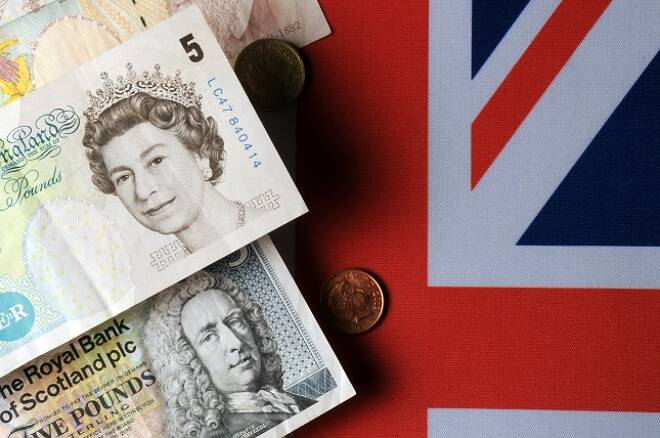Advertisement
Advertisement
Brexit and Economic Data Put the Pound Front and Center
By:
It's a positive start to the day for the Pound. Markets have a worst-case scenario being a delay, while a soft could be the outcome if Theresa May wins.
Earlier in the Day:
Economic data released through the Asian session this morning was on the lighter side once more. The session kicked off with 1st quarter manufacturing condition figures out of Japan. Out of Australia, new home loan figures and February business confidence numbers provided direction for the Aussie Dollar.
For the Japanese Yen,
The BSI Large Manufacturing Conditions Index fell from 5.5 to -7.3 points for the 1st quarter. Forecasts were for the index to fall to 4.80 points.
A material slide was of little surprise considering recent trade and manufacturing PMI numbers out of Japan.
The Japanese Yen moved from ¥111.338 to ¥111.328 against the U.S Dollar, upon release of the figures. At the time of writing, the Yen was down 0.10% at ¥111.32.
For the Aussie Dollar,
New home loans fell by 2.4% in January. Following a revised 3.6% slide in December, forecasts were for a 2% decline.
According to figures released by the ABS,
- A 2.1% fall in lending for dwellings weighed on overall lending to households. Lending for investment dwellings tumbled by 4.1%, with lending for owner-occupied dwellings falling by 1.3%.
- Year-on-year, new home loans is down 20%, which is the largest year-on-year slide since 2008.
Business confidence also took a hit in February. The NAB Business Confidence Index eased from +4points to +2 points. Forecasts were for the index to fall to +3 points.
According to the NAB Monthly Business Survey,
- In spite of the downward trend, the employment sub-index was reportedly resilient, as labor market demands lag economic activity.
- The Business Conditions Index fell by 3 points to +4 points. The decline was attributed to a fall in the sub-indexes for profitability and for trading.
- There were declines in forward-looking indicators, with capacity utilization also on a downward trend.
- Across the industries, the retail sector continued to be the most negative, though the downward trend was broad-based in February.
The Aussie Dollar moved from $0.70666 to $0.70632 upon release of the figures. At the time of writing, the Aussie Dollar stood at $0.7067, down by 0.04% for the session.
Elsewhere,
The Kiwi Dollar was on the move. At the time of writing, the Kiwi Dollar was up by 0.16% to $0.6841. Market risk appetite provided much-needed support, though a larger contribution would have come from monetary policy divergence in favor of the Kiwi.
The Day Ahead:
For the EUR
French non-farm payroll figures for the 4th quarter are due out. Barring a material deviation from forecasts, we would expect the figures to be brushed aside later this morning.
Outside of the numbers and in spite of more disappointing data out of Germany on Monday, the risk-on sentiment is EUR positive. Additionally, concerns over a sharper slowdown in U.S growth than previously anticipated will provide some support to the EUR. U.S retail sales figures were positive for January, but a sharp downward revision to December sales figures raises a red flag on 4th quarter growth.
Downside risk could come from an unexpected result to the Parliamentary vote on Brexit or negative news on trade talks.
At the time of writing, the EUR up by 0.06% at $1.1252.
For the Pound
It’s B-Day for the Pound. Theresa May’s deal, in whatever form, could be torn apart by Parliament later today. The day will culminate with a meaningful vote that is expected to throw out a deal and lead to an extension to 29th March.
The Pound has been on a tear as news hits the wires of the British PM managing to negotiate changes to the previous deal. It remains to be seen whether the new deal is good enough for Parliament…
On the data front, it’s a busy day ahead. GDP, industrial and manufacturing production and trade data are due out. While Brexit will be the key driver through the day, we can expect some influence from the numbers. Later this afternoon, the NIESR GDP figure will also need to be considered.
At the time of writing, the Pound was up by 0.40% to $1.3203.
Across the Pond
Inflation figures for February are due out later this afternoon. The Dollar could be in for a hammering if there are softer numbers. December’s revised retail sales figures certainly raise the prospects of a more dovish FED. Softer inflation could push the chances of a rate hike back to the 4th quarter, at the earliest.
At the time of writing, the Dollar Spot Index was down by 0.13% to 97.089.
For the Loonie
It’s another quiet day on the economic calendar. There are no material stats scheduled for release, which can only be a good thing for the Loonie. A softer U.S Dollar has provided support to crude oil prices following news of the Saudis planning to cut production.
In spite of further gains in crude oil prices in the early hours of this morning, a particularly dovish BoC will likely limit the upside for the Loonie near-term.
The Loonie was down 0.06% at C$1.3402, against the U.S Dollar, at the time of writing.
About the Author
Bob Masonauthor
With over 28 years of experience in the financial industry, Bob has worked with various global rating agencies and multinational banks. Currently he is covering currencies, commodities, alternative asset classes and global equities, focusing mostly on European and Asian markets.
Advertisement
